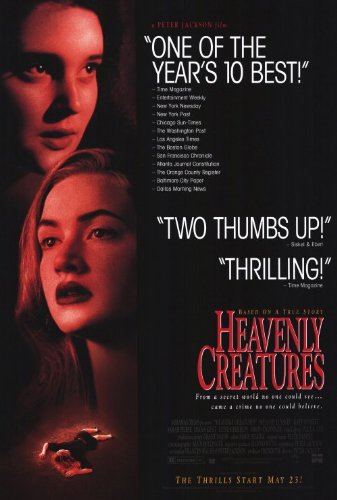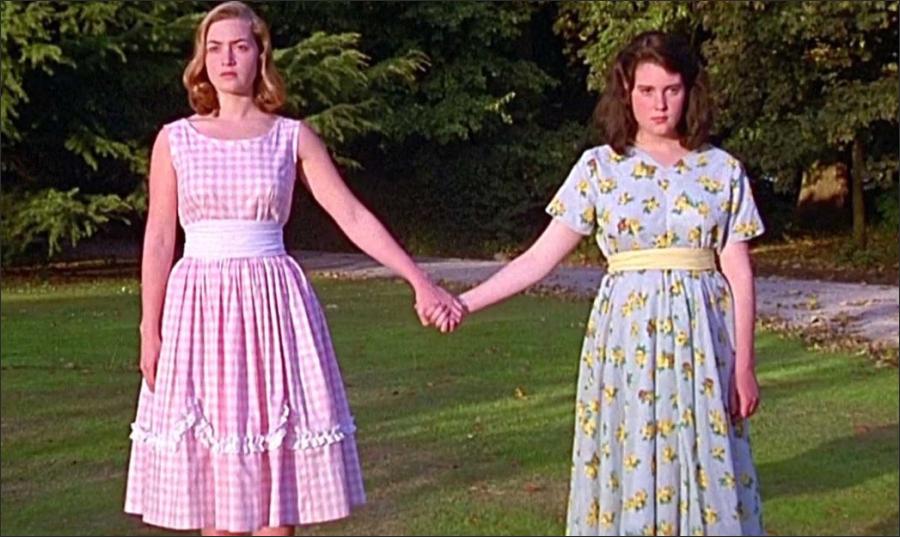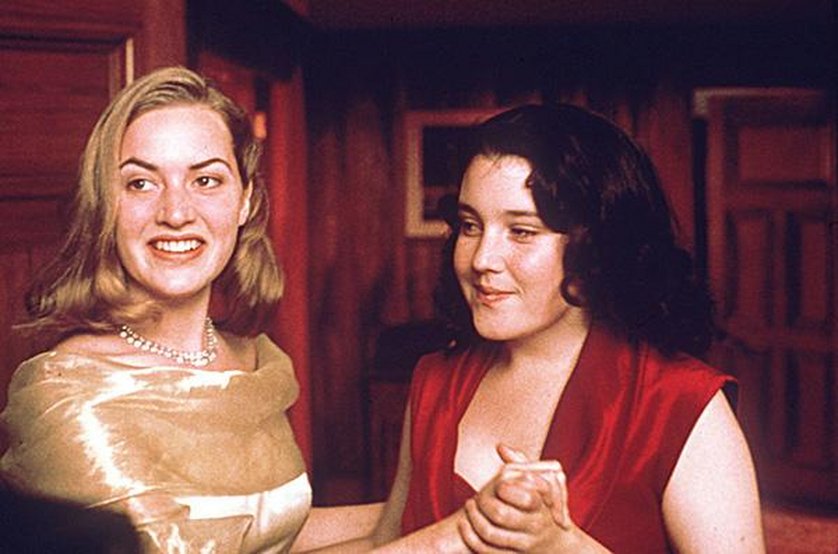 I can’t imagine a better film about the notorious Parker-Hulme murder that rocked New Zealand in 1954. HEAVENLY CREATURES was the first “serious” film by Peter Jackson, and it remains one of his absolute best.
I can’t imagine a better film about the notorious Parker-Hulme murder that rocked New Zealand in 1954. HEAVENLY CREATURES was the first “serious” film by Peter Jackson, and it remains one of his absolute best.
HEAVENLY CREATURES was the first “serious” film by Peter Jackson, and it remains one of his absolute best.
This film followed BAD TASTE, MEET THE FEEBLES and BRAINDEAD (DEAD ALIVE in the U.S.), over-the-top comedic gorefests all. Quite a few commentators believed Peter Jackson was trying to breach the mainstream with 1994’s HEAVENLY CREATURES, and many horror fans have underrated or ignored it outright for that reason. That’s a shame, as it’s just as subversive in its own way as Jackson’s earlier work, even as it proclaims a maturity and dramatic facility not evident in the earlier films.
…just as subversive in its own way as Jackson’s earlier work, even as it proclaims a maturity and dramatic facility not evident in the earlier films.
The cast of HEAVENLY CREATURES is packed with experienced actors from England and New Zealand, with two young newcomers at its center: Melanie Lynskey, who’s gone onto to become a busy supporting actress in TV and film, and Kate Winslet, who was already a veteran theater performer, and whose subsequent career needn’t be recounted here.
The facts of the Parker-Hulme case are these: teenaged Pauline Parker and Juliet Hulme created a private fantasy world involving an alternate realm known as the Fourth World. For reasons that have never been fully explained, the two lured Parker’s mother to a secluded spot and beat her to death. Pauline and Juliet were incarcerated for five years apiece for the crime, and forbidden to see each other ever again. One intriguing fact that emerged from this film’s release was that Juliet Hulme (the Kate Winslet character) grew into the popular mystery novelist Anne Perry.
From what I understand, the script by Jackson and wife Francis Walsh follows the particulars of the case fairly closely, though with the expected minor changes and omissions. Another film inspired by the case, the French DON’T DELIVER US FROM EVIL, uses it as a jumping-off point to tell its own shallow, Catholic bashing account. See HEAVENLY CREATURES instead.

In New Zealand during the early fifties Pauline, a lower class schoolgirl, befriends the prim and proper Juliet, who lives with her wealthy English parents in a gaudy mansion. Despite the class differences the two form a quick friendship based on common experiences—both had long periods of childhood illness—and a shared love of romantic fantasy. They evolve a complex private world involving a scheming royal family and a visionary realm reachable only on certain ecstatic occasions.
When Juliet contacts tuberculosis and has to be hospitalized, Pauline becomes her one lifeline. The friendship thus grows far deeper, and the two plan to immigrate to Hollywood, where they’re sure they’ll find ready modeling work.
But then Juliet catches her mom cheating on her father with another man, and shortly thereafter her parents reveal they’re going to divorce. Juliet is devastated by the news, and even more so by her father’s plan to move to South Africa and take her with him.

Pauline, meanwhile, is growing increasingly fed up with her mother. After a night spent “imitating” the lovemaking of their fantasy characters Pauline and Juliet plot to kill Pauline’s mother. Once she’s dead, they figure, they’ll be free to head off to Hollywood together with Juliet’s parents.
The “Happy Event” takes place in a secluded bluff where Pauline and Juliet lure Pauline’s mother. There they bash her head in with a big rock, a so-called Happy Event that, contrary to the girls’ plans, ends deeply unhappily for both.
Peter Jackson was never a director known for his subtlety, and HEAVENLY CREATURES all-but overflows with a creative exuberance that’s anything but restrained. Everything about the film is bold and excessive, from the constantly swooping camerawork to the overwrought melodrama and performances. The cast appears to have been encouraged to act as unfettered as possible, which can be off-putting to an audience used to more subtle, naturalistic fare.
Peter Jackson was never a director known for his subtlety, and HEAVENLY CREATURES all-but overflows with a creative exuberance that’s anything but restrained.

Jackson’s unsubtle approach works in his favor, however, as the subject is the world viewed through the eyes of two fantasy-obsessed girls. Only in this film’s larger-than-life universe can the camera enter through a tiny doorway and dash through the interior of a sand castle without feeling the slightest bit jarring—or depict a kingdom of life sized clay figures having an orgy, or show the protagonists chased by a two-dimensional black-and-white Orson Wells.
Only in this film’s larger-than-life universe can the camera enter through a tiny doorway and dash through the interior of a sand castle without feeling the slightest bit jarring…
Of course the final scenes are dead serious. The girls’ increasing drift from reality is portrayed with uncomfortable vividness, and the methodical murder of Pauline’s mother is horrifying and off-putting—just as it should be. It is, however, considerably toned down from the actual killing, which reportedly entailed over 40 blows to the victim’s head.
…toned down from the actual killing, which reportedly entailed over 40 blows to the victim’s head.
Of the actors, Kate Winslet fares the best. It’s no surprise she became a star shortly after the film’s release; the role of Juliet Hulme in my view is Winslet’s finest performance, carried off with an intensity she has yet to match in any subsequent film.
Vital Statistics
HEAVENLY CREATURES
Wingnut Films/Miramax Films
Director: Peter Jackson
Producer: Jim Booth
Screenplay: Peter Jackson, Frances Walsh
Cinematography: Alun Bollinger
Editing: Jamie Selkirk
Cast: Melanie Lynskey, Make Winslet, Sarah Peirse, Diana Kent, Clive Morrison, Simon O’Connor, Jed Brophy, Peter Elliot, Gilbert Goldie, Geoffrey Heath, Kirsti Ferry, Ben Skjellerup, Darien Tackle, Elizabeth Mood
